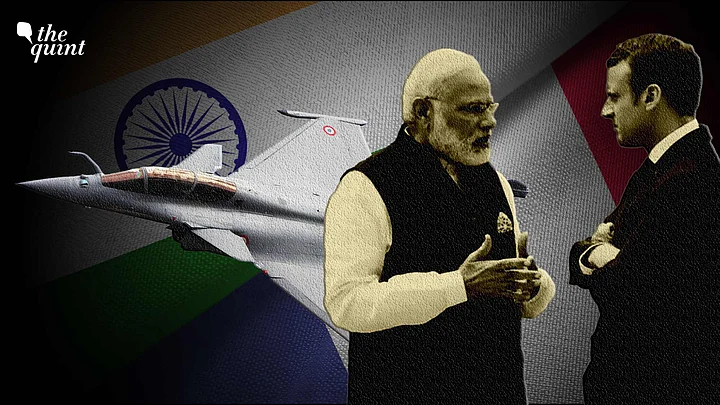(This article was originally published on 11 July 2023 and is being republished in light of French President Emmanuel Macro landing in Jaipur on 25 January to attend the 75th Republic Day parade as the chief guest.)
Prime Minister Narendra Modi’s visit to France as the chief guest of the Bastille Day Parade on 14 July is in keeping with his government’s emphasis on "multi-alignment”. As is well known, France, though a member of the North Atlantic Treaty Organization (NATO), adopts a position that stresses its "strategic autonomy”.
This is the second such visit – the first was by Dr Manmohan Singh in 2009 when, he, too was the chief guest on Bastille Day. The event celebrates the fall of the Citadel of Bastille in Paris on 14 July 1789, marking the onset of the French Revolution.
The castle was hated by the people since it was the place where the French monarchy imprisoned dissidents and rebels.
The occasion is celebrated by a grand military parade and this time, as in 2009, there will be an Indian military contingent comprising infantrymen and a military band accompanying them. Reportedly, IAF Rafale will be part of the flypast.
Indo-French Defence Partnership
In keeping with the more recent "tradition” of conducting top-level arms deals, it is expected that India and France will finalise a deal for the supply of 24-30 Rafale Marine aircraft for the Indian Navy’s home-designed and -made aircraft carrier, the Vikrant. The aircraft has been shortlisted after intense competition with the American FA 18 Super Hornet.
What won the day for the French aircraft is its 80 percent compatibility with the 36 Rafales India acquired during PM Modi’s visit to Paris in 2015. In addition to maintenance and repair, this compatibility will impact the training of the personnel.
Relations with France are part of India’s global strategy of developing links with all major global players and enhancing Indian interests wherever possible. India has had historical ties where Paris has broadly supported India on Kashmir and was one of the few countries to refuse to impose sanctions on New Delhi on account of the nuclear test of 1998.
The Indo-French relationship is also built upon technical and scientific cooperation and significant arms transfer ties that go back to the 1950s. Their more recent manifestations have been the 2015 deal for 36 Rafale fighter jets and the launch of the last of six Scorpene-class submarines built in India in April 2022.
In an interview with a channel, French Ambassador to India Emmanuel Lenain said that France’s relations with India now need to move beyond co-development and co-production to joint development. This is an ambitious goal since the levels of Indian and French technology and industrial culture are vastly different.
Recall some years ago Dassault refused to provide warranties for any Rafale fighters that HAL may make. As a result, the project collapsed and India simply bought 36 Rafale off-the-shelf.
Security Cooperation in Indo-Pacific
Another element in the India-France relationship is security cooperation in the western Indian Ocean. France is a resident Indo-Pacific power and it has, of late, stepped up its interest in the region. It is also pushing the European Union Indo-Pacific strategy.
The main thrust of India’s security cooperation with the US is on the geographical area of the US Indo-Pacific Command whose territory includes only the western shores of India. But, for India, the Arabian Sea is its key concern for maritime security. Here, France, with bases in Djibouti and the UAE, and island territories like Reunion and the islands of Mayotte, is a good partner.
Something that is not too well known is the enormous size of France’s Exclusive Economic Zone in the Indian and Pacific Oceans and its interest in maritime security there. Ten percent of the Indian Ocean surface is France’s Exclusive Economic Zone.
India and France are joined together by their bilateral naval exercise 'Varuna' whose 20th edition took place last October. The Indian, French, and the UAE conducted their maiden trilateral exercise early last month. Last year, India joined the French flagship naval exercise, La Perouse, for the first time along with three other Quad countries – the US, Japan, and Australia.
On Strategic Autonomy
Indeed, in 2018, French President Macron suggested that India, France, and Australia create a trilateral grouping to foster their interests in the Indo-Pacific.
During President Macron’s visit to New Delhi, India and France signed up on a “Joint Strategic Vision of India-France Cooperation in the Indian Ocean" as a kind of roadmap to provide direction to their ties.
As was the case with the Americans, a lot of legwork for the visit has been done by National Security Adviser Ajit Doval who met his French counterpart Emmanuel Bonne several times in the past four years.
PM Modi had visited Paris last year as part of his European tour. At the time, it was apparent that there was important congruence between India and France on the issue of strategic autonomy. There was a marked difference on Ukraine, evident in the joint statement after the visit.
Yet, at the time, Foreign Secretary VM Kwatra had noted in his post-visit briefing that not only were the two countries “strong strategic partners”, but Modi and Macron “are also good friends.”
(The writer is a Distinguished Fellow, Observer Research Foundation, New Delhi. This is an opinion piece and the views expressed above are the author’s own. The Quint neither endorses nor is responsible for the same.)
(At The Quint, we question everything. Play an active role in shaping our journalism by becoming a member today.)
